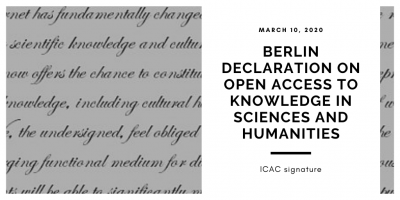Open Science Facilities at ICAC
- Open Science Website
A dedicated website for open science, aiming to facilitate the adoption of open science practices by ICAC researchers.
Access: https://openscience.icac.cat/
- Catalonia Research Portal (CORA.PRC)
Since June 2018, ICAC has been part of the Catalonia Research Portal (CORA.PRC), a platform designed to showcase and disseminate all research in Catalonia from a single access point, facilitating open access to scientific output.
Access: https://portalrecerca.csuc.cat/

- CORA. Research Data Repository (CORA.RDR)
In 2021, ICAC joined CORA. Research Data Repository (CORA.RDR), a federated and multidisciplinary repository managed by CSUC. It enables universities, CERCA research centers, and other research institutions in Catalonia to publish research datasets following the FAIR principles (Findable, Accessible, Interoperable, and Reusable) and the European Open Science Cloud (EOSC) guidelines.
Its objectives include enhancing the efficiency and transparency of research by ensuring rapid data dissemination and facilitating data reuse.
Access: https://dataverse.csuc.cat/
- CORA.eiNa DMP
A Data Management Plan (DMP) is a formal document that describes the data generated or collected throughout a project’s lifecycle and outlines strategies for managing them during and after the project.
Since 2021, ICAC has been part of CSUC’s eiNa DMP platform, providing researchers with tools to create data management plans for projects funded by Horizon 2020, the European Research Council (ERC), the Spanish State Plan, and other funding agencies.
Researchers can now create DMPs online following FAIR principles, access guidelines and real examples, collaborate effectively, and save significant time and effort.
Access: https://dmp.csuc.cat/
- Recercat
ICAC has participated in Recercat (Catalonia Research Repository) since 2014. This cooperative repository, promoted by CSUC, provides access to research literature from Catalan universities and research institutions, including articles, research papers, master’s theses, conference proceedings, reports, working papers, and more.
ICAC regularly uploads its research outputs to Recercat, and users can consult download and access statistics generated for the institution.
Access: https://recercat.cat/
Regulatory Framework
- Open Access Policy (2015)
In 2015, ICAC adopted an institutional open access policy, committing its scientific community to deposit research outputs in the institutional repository, respect intellectual property rights, consider research data and metadata, follow international open access repository standards, and provide persistent identifiers for perpetual access.
Access: http://hdl.handle.net/2072/376566
- Endorsement of the Berlin Declaration on Open Access to Knowledge in the Sciences and Humanities (2020)
Since March 10, 2020, ICAC has been among the 650 institutions worldwide that have signed the Berlin Declaration on Open Access to Knowledge in the Sciences and Humanities, one of the landmark documents of the Open Access Movement managed by the Max Planck Society.
Access: http://hdl.handle.net/2072/527587

- Open Research Data Management Protocol (2021)
To formalize ICAC’s institutional commitment to open research data management following FAIR principles, increase research efficiency and transparency, and ensure compliance with legal regulations, ICAC’s Governing Council approved the Open Research Data Management Protocol on December 13, 2021.
This protocol applies to all ICAC researchers (including affiliated staff) and requires that publicly funded project data be deposited in the CORA. Research Data Repository or in recognized archaeological or multidisciplinary repositories of international prestige.
Access to the document: http://hdl.handle.net/2072/521684
- Research Software Management Protocol (2024)
Open-source software, aligned with FAIR principles (Findable, Accessible, Interoperable, and Reusable), fosters collaboration among researchers, stakeholders, and society.
The Catalan Institute of Classical Archaeology (ICAC) recognizes the significance of research software and has developed a protocol to enhance its visibility and reuse.
Approved by the ICAC Governing Council on December 19, 2024, this document complements the Open Research Data Management Protocol.
Access to the document: http://doi.org/10.51417/2024_31_6_9





